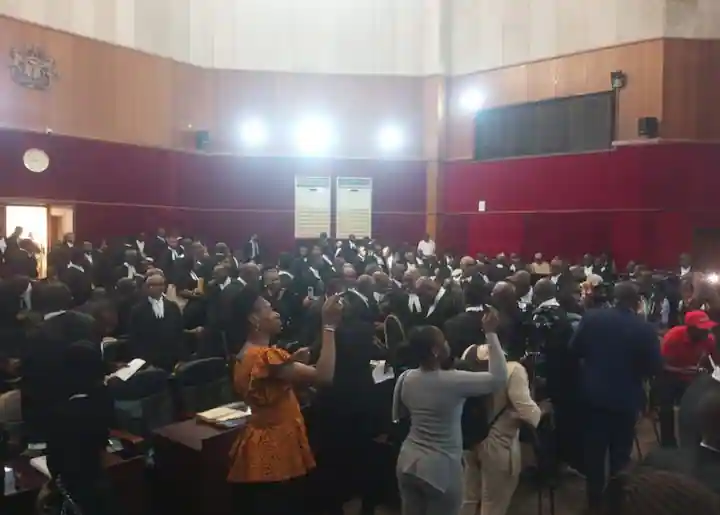By Ade Martins-
The Presidential Election Petition Court, PEPC, on Monday, held its inaugural session, a legal ritual that precedes the actual hearing of petitions seeking to nullify the outcome of the 2023 presidential election.
The presidential tribunal at the Court of Appeal in the capital, Abuja, heard the opening statements of lawyers representing opposition parties, which are the challenging the outcome of the February vote won by Bola Tinubu of the ruling All Progressives Congress.
As the court hearing began, armed security personnel blocked major access roads and prevented a handful of journalists and lawyers from entering the facility. Some protesters waved Nigerian flags and displayed placards, alleging that the elector
At the session was a five-member panel of Justices of the Court of Appeal that will hear and determine all the five petitions challenging the declaration of Bola Tinubu of the ruling All Progressives Congress, APC, as the winner of the presidential election.
The panel will be headed by the Presiding Justice (PJ) of the Abuja Division of the Court of Appeal, Justice Haruna Tsammani, other members of the panel are; Justice Stephen Adah (PJ Asaba Division), Justice Monsurat Bolaji-Yusuf (Asaba Division), Justice Boluokuromo Ugo (Kano Division), as well as Justice Abba Mohammed (Ibadan Division).
The five justices will jointly decide whether the litigants hoping to reverse the 2023 presidential elections will be overturned, and if so, in whose favour.
Nigeria’s election commission(INEC) declared Tinubu the winner of the election in a televised broadcast after he garnered 37% of the votes. But the two main opposition candidates rejected the result, questioning Tinubu’s qualification and alleging that results from the country’s 177,000 polling stations were tampered with.
Analysts and observers said that the voting on Feb. 25 was largely an improvement from Nigeria’s previous elections, but said that delays in uploading results might have given room for the figures to be tampered with.
In separate petitions, both runner up contender, Atiku Abubakar of the Peoples Democratic Party and No. 3 finisher Peter Obi of the Labour Party argued that Nigeria’s electoral commission violated the provisions of the law in announcing the results of the election, and as such should be set aside.
The results of a presidential election in Nigeria has never been overturned, but one of the litigants in this case, Labour Party leader, Peter Obi, has one court challenges against elections at governorship level on two separate occasions.
He faces a different type of challenge this time against the very wealthy Bola Tinubu, who his critics say has the money to buy any judge in the world. That’s beside the very reasonable question of whether the party’s together have a solid case to show that the election outcome was defrauded.
There is no argument that that there were several irregularities in February’s elections which saw a jungle type election in many cities in which direct intimidation of voters was visible, and ballot boxes were snatched. The tragic reality is that the political elites are usually accused of masterminding violent interferences of the kind witnessed at several polling stations in February.
Aggrieved parties have three week to achieve any reversal of the elections, and their doubts that the time needed for the completion of due process will occur before Tinubu is inaugurated as president. Many fear this will make it virtually impossible for any fair hearing under his jurisdiction.
Most analysts do not think aggrieved parties have any solid evidence to prove that Tinubu actually lost the elections, but evidence of ballot snatching, voter suppression, and and some incompatibilities between the tital number of votes announced at some polling units and those released by electoral body INEC, bas led to many raised eye browns.
In his opening remarks, the Presiding Justice, Tsammani, urged lawyers representing all the petitioners to avoid sensational comments, stressing that the court would not tolerate time-wasting tactics and technicalities.
He said: “As we commence hearing of the petitions, let us avoid making sensational comments. Let us consider the safety and interest of the country, that is paramount.
“We should avoid unnecessary time-wasting applications and objections so that we can look at substance of the case rather than unnecessary technicalities.
“Let us corporate with each other so that everyone will be satisfied that justice has been done”.
Responding, lead counsel to the President-elect, Chief Wole Olanipekun, SAN, assured the court of the maximum corporation of his team, saying there was a need for the matter to be determined without recourse to unnecessary technicalities.
Likewise, the head of the team of lawyers representing the presidential candidate of the Peoples Democratic Party, PDP, Atiku Abubakar, Chief Chris Uche, SAN, said they would do everything possible to assist the court to do justice.
On his part, Dr Livy Uzoukwu, SAN, who is representing the Labour Party and its candidate, Mr Peter Obi, noted that the petitions were of great public interest, saying “At the end of the day, I am very confident that the petitions will impact on Nigeria’s jurisprudence and constitutionalism”.
“We will do everything possible to assist your Lordships,” he added.
Likewise, the Independent National Electoral Commission, INEC, through its lawyer, Mr A. B. Mahmood, SAN, expressed confidence in the electoral body on the ability of the court to do justice on all the petitions before it.
“My lords, we are confident that at the end of the day, justice will be done,” Mahmood, SAN, stated.
Meanwhile, the court said it would only conduct pre-hearing session on three of the petition, while the remaining two petitions would be heard on Tuesday.
The three petitions the court said it would hear, were the ones the Action Alliance, AA, filed against INEC, that of the All Peoples Party, APP, as well as the petition by Obi and the LP.
While the remaining petitions are the ones filed by the Allied Peoples Movement, APM, and Atiku of the PDP.




